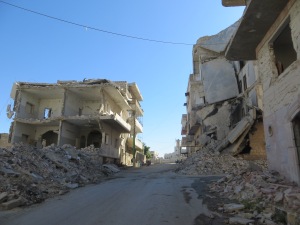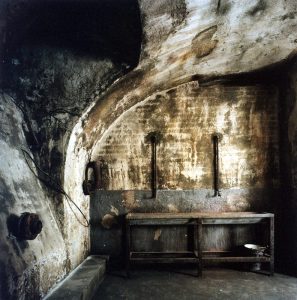We summarise some of the biggest news stories, statements, events and news from the World Without Torture blog, Facebook and Twitter pages over the month of April.
Don’t forget to keep checking the blog in the coming weeks for more. And click here to visit our Facebook page, and here to visit our Twitter feed.

Audience at the event
On 8 April 2014, the IRCT hosted a large event – including members, donors, and staff of the IRCT – to celebrate the 40th anniversary of the beginning of the anti-torture movement, which began in Denmark and spread across the globe.
The event marks 40 years since human rights defender, Dr Inge Genefke, placed an advertisement requesting help from doctors willing to investigate torture in Chile, an advert which encouraged the development of the first medical group for the rehabilitation of torture victims in Denmark.
From this beginning on 8 April 1974, the first medical group under Amnesty International was created, and from this blossomed the evolution of the anti-torture movement, including the International Rehabilitation Council for Torture Victims (IRCT).
The event included music, poetry readings from two brave torture survivors, and the presentation of the prestigious Inge Genefke Award – won by IRCT’s Lilla Hardi.
To read about our role in the campaign just click this link.
 Our most popular blog series this month has been our new Rwanda: 20 years on campaign which reflects on the horrors of the biggest genocide in recent memory by telling the stories of female victims of sexual violence.
Our most popular blog series this month has been our new Rwanda: 20 years on campaign which reflects on the horrors of the biggest genocide in recent memory by telling the stories of female victims of sexual violence.
The campaign, which will run throughout the 100 day period of the genocide until mid-July, sees a new survivor of torture telling their story every two weeks.
To kickstart the campaign, this month we heard from four women – Illuminee, Charline, Hildegarde, and Mameritha – who have all overcome experiences of rape, and the trauma of losing loved ones, through specialist sociotherapy treatment.
To read all the stories from the campaign, click this link. And keep checking the blog, our Facebook, and Twitter for future updates to the campaign.

A member of staff at the centre in Malmö treating one of their many clients
Sweden has a good record when it comes to human rights and torture prevention and rehabilitation. But problems of excessive police force, and alleged mistreatment of refugees, still echo through the country each year.
Providing support in these instances is the The Swedish Red Cross Center for Victims of Torture and War in Malmö. Primarily aimed at refugees and their families in Skåne, southern Sweden, the main mission of this Swedish IRCT member is to give support to refugees who have experienced war, imprisonment, torture and mistreatment while in exile to Sweden or in their home country.
To read more about what they are doing to assist refugees – many of whom are torture survivors – just click this link.
Our most popular story shared on Facebook this month was this piece from UK newspaper the Guardian who secured an exclusive interview with one of the architects of the CIA’s interrogation programme, which includes allowance for torture.
Dubbed ‘enhanced interrogation’, the short interview with James Mitchell shows one thing very clearly – after all of the alleged torture, there is still no remorse or regret for the effects it may have caused the victims.
Views like this only help to justify and promote the use of torture across the globe, rather than helping to stop it. And you agreed too – allowances for torture like this have to stop. Click here to read the story in the Guardian.

In this blog, we hear from Ida Harriet Rump, a photographer and student in Middle Eastern studies at Lund University, Sweden, who has regularly travelled through Syria since 2006.
Ida spent around one year in Damascus and, after the conflict began in 2011, Ida has twice visited north-western city Idlib with grassroots solidarity network Witness Syria – an initiative connecting activists inside and outside of the country.
Throughout her travels, Ida has seen the damage of the conflict, the pain it causes families and refugees, and has heard stories of torture along the way. In her first blog for World Without Torture, Ida uses a series of pictures to capture the fear, hope and everyday life in the city of Ma’arrat al-Numan.
Click this link to view her full range of pictures.
 Veli’s story is complex, unusual, and powerful. Caught up in a prison siege in Turkey in 2000, Veli lost his arms after armed security forces stormed his prison block with a bulldozer which tore down the wall where Veli was standing, ripping off his right arm.
Veli’s story is complex, unusual, and powerful. Caught up in a prison siege in Turkey in 2000, Veli lost his arms after armed security forces stormed his prison block with a bulldozer which tore down the wall where Veli was standing, ripping off his right arm.
After years of torture rehabilitation and legal assistance from IRCT member the Human Rights Foundation of Turkey, Veli was granted a ruling from the European Court of Human Rights which specified his entitlement to compensation.
And so the compensation was paid – until the Turkish authorities overruled the payment. Now they demand that Veli pays the compensation back, at a much higher rate than it was awarded to him.
We joined the Human Rights Foundation Turkey in pressuring the state to end this case and to stop this extended miscarriage of justice by tweeting with the hashtag #JusticeforVeli.
However, despite the pressure, once again his hearing has been postponed, this time until July 2014. This continual postponement means Veli has now been fighting for justice for 14 years, which is far too long.
We shall join the Human Rights Foundation in Turkey later on in the year to campaign again. To read more on Veli’s case, and to see how we are helping fight for his rights, click this link.

The torture chamber (picture courtesy of Rajmund Fekete, House of Terror museum)
And finally, over the Easter break IRCT’s Communications Officer Ashley Scrace visited the House of Terror in Budapest, Hungary – a chilling museum detailing the torture inflicted upon political opponents through the regimes of the Nazis and the Soviet Union.
The museum itself is actually based in the building which acted as the secret police headquarters throughout both periods of history, a building which was renowned for its underground torture chambers (which has been reconstructed for visitors today).
You can read more about the unique museum, and can see pictures of the museum, by clicking this link.



















 Our most popular blog series this month has been our new
Our most popular blog series this month has been our new 




